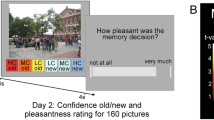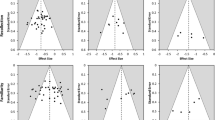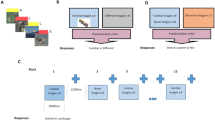Abstract
The retrieval of information from long-term memory can be associated with information regarding sources or context (recollection) or without further context (familiarity). The retrieval type depends on how information has been encoded previously, and this encoding process is supposed to be modulated by the neurotransmitters dopamine and acetylcholine. For example, acetylcholine levels in the hippocampus increase when one is confronted with novel information allowing for better encoding and, presumably, for retrieval of more detailed memories (recollection). On the other hand, a dopaminergic deficit such as in Parkinson’s disease has been shown to induce deficits in familiarity rather than in recollection-based retrieval. It is, however, unclear whether this finding arises from alterations in encoding, retrieval, or both. Moreover, other research has challenged this clear-cut dichotomy and linked dopamine to both familiarity and recollection, and acetylcholine to unspecific enhancement of memory for novel information. Thirty-nine healthy seniors (age range 62–77) participated in a remember/know task in which scenes that were presented with different repetition rates had to be encoded and retrieved on the following day. Neurotransmitter levels were modulated during encoding by administrating either levodopa (100 mg, N = 13) or galantamine (8 mg, N = 13) to one of two experimental groups. A third group received a placebo (N = 13). Across all groups, recognition memory increased as a function of stimulus repetition, and this effect was specifically pronounced for remember relative to know answers. Importantly, the drugs had no effect on recollection, familiarity, or overall recognition memory. The findings argue against a simple dichotomy of dopaminergic and cholinergic contributions to either recollection- or familiarity-based memory retrieval.




Similar content being viewed by others
References
Bäckman, L., Nyberg, L., Lindenberger, U., Li, S.-C., & Farde, L. (2006). The correlative triad among aging, dopamine, and cognition: Current status and future prospects. Neuroscience & Biobehavioral Reviews, 30(6), 791–807.
Barnes, L., Boubert, L., Harris, J., Lee, A., & David, A. S. (2003). Reality monitoring and visual hallucinations in Parkinson’s disease. Neuropsychologia, 41(5), 565–574.
Blatt, J., Vellage, A.-K., Baier, B., & Müller, N. (2014). The contribution of acetylcholine and dopamine to subprocesses of visual working memory—what patients with amnestic mild cognitive impairment and Parkinson’s disease can tell us. Neuropsychologia, 61, 89–95.
Bloemendaal, M., Froböse, M. I., Wegman, J., Zandbelt, B., van de Rest, O., Cools, R., & Aarts, E. (2018). Neuro-cognitve effects of tyrosine administration on reactive and proactive response inhibition in healthy older adults. eNeuro., 5(2), ENEURO.0035-17.2018. https://doi.org/10.1523/ENEURO.0035-17.2018.
Bunzeck, N., Guitart-Masip, M., Dolan, R. J., & Duzel, E. (2014). Pharmacological dissociation of novelty responses in the human brain. Cerebral Cortex, 24(5), 1351–1360 Bhs420.
Chowdhury, R., Guitart-Masip, M., Bunzeck, N., Dolan, R. J., & Düzel, E. (2012). Dopamine modulates episodic memory persistence in old age. Journal of Neuroscience, 32(41), 14193–14204.
Cools, R., & D'Esposito, M. (2011). Inverted-U-shaped dopamine actions on human working memory and cognitive control. Biological Psychiatry, 69(12), 113–125.
Davidson, P. S. R., Anaki, D., Saint-Cyr, J. A., Chow, T. W., & Moscovitch, M. (2006). Exploring the recognition memory deficit in Parkinson’s disease: Estimates of recollection versus familiarity. Brain, 129, 1786–1779.
Dewhurst, S. A., & Anderson, S. J. (1999). Effects of exact and category repetition in true and false recognition memory. Memory and Cognition, 27(4), 664–673.
DGN. (2016). S3-Leitlinie Idiopathisches Parkinson-Syndrom: Springer. Heidelberg: Berlin.
DGPPN & DGN. (2017). S3-Leitlinie Demenzen. Berlin, Heidelberg: Springer Berlin Heidelberg.
Dumas, J. A., & Newhouse, P. A. (2011). The cholinergic hypothesis of cognitive aging revisited again: Cholinergic functional compensation. Pharmacology Biochemistry and Behavior, 99(2), 254–261.
Dunn, J. C. (1996). Remember-know: A matter of confidence. Psychological Review, 111(2), 524.
Eckart, C., Woźniak-Kwaśniewska, A., Herweg, N. A., Fuentenmilla, L., & Bunzeck, N. (2016). Acetylcholine modulates human working memory and subsequent familiarity based recognition via alpha oscillations. Neuroimage, 137, 61–69.
Edelstyn, N. M., Mayes, A. E., Condon, L., Tunnicliffe, M., & Ellis, S. J. (2007). Recognition, recollection, familiarity and executive function in medicated patients with moderate Parkinson’s disease. Journal of Neuropsychology, 1(2), 131–147.
Edelstyn, N. M., Shepherd, T. A., Mayes, A. R., Sherman, S. M., & Ellis, S. J. (2010). Effect of disease severity and dopaminergic medication on recollection and familiarity in patients with idiopathic nondementing Parkinson’s. Neuropsychologia, 48(5), 1367–1375.
Edelstyn, N. M., John, C. M., Shepherd, T. A., Drakeford, J. L., Clark-Carter, D., Ellis, S. M., & Mayes, A. R. (2015). Evidence of an amnesia-like cued-recall memory impairment in nondementing idiopathic Parkinson’s disease. Cortex, 71, 85–101.
Eichenbaum, H. E., & Cohen, N. J. (2001). From Conditioning to Conscious Recollection: Memory Systems of the Brain (Colume 35). Oxford: University Press.
Eichenbaum, H. E., Yonelinas, A. R., & Ranganath, C. (2007). The medial temporal loba and recognition memory. Annual Review of Neuroscience, 30, 123–152.
Froeliger, B., Gilbert, D. G., & McClernon, F. J. (2009). Effects of nicotine on novelty detection and memory recognition performance: Double-blind, placebo-controlled studies of smokers and non-smokers. Psychopharmacology, 205(4), 625–633.
Gasbarri, A., Packard, M. G., Campana, E., & Pacitti, C. (1994). Anterograde and retrograde tracing of projections from the ventral tegmental area to the hippocampal formation in the rat. Brain Research Bulletin, 33(4), 445–452.
Hasselmo, M. E. (2006). The role of acetylcholine in learning and memory. Current Opinion in Neurobiology, 16(6), 710–715.
Heathcote, A., Frances, R., & Dunn, J. (2006). Recollection and familiarity in recognition memory: Evidence from ROC curves. Journal of Memory and Language, 55(4), 495–514.
Karrer, T. M., Josef, A. K., Mata, R., Morris, E. D., & Samanez-Larkin, G. R. (2017). Reduced dopamine receptors and transporters but not synthesis capacity in normal aging adults: A meta-analysis. Neurobiology of Aging, 57, 36–46.
Knecht, S., Breitenstein, C., Bushuven, S., Wailke, S., Kamping, S., Flöel, A., Zwitserlood, P., & Ringelstein, E. B. (2004). Levodopa: Faster and better word learning in normal humans. Annals of Neurology, 56(1), 20–26.
Koen, J. D., & Yonelinas, A. P. (2014). The effects of healthy aging, amnestic mild cognitive impairment, and Alzheimer’s disease on recollection and familiarity: A meta-analytic review. Neuropsychology Review, 24(3), 332–354.
Li, S.-C., Lindenberger, U., & Bäckman, L. (2010). Dopaminergic modulation of cognition across the life span. Neuroscience & Biobehavioral Reviews, 34(5), 625–630.
Libby, L. A., Yonelinas, A. P., Ranganath, C., & Ragland, J. D. (2013). Recollection and familiarity in schizophrenia: A quantitative review. Biological Psychiatry, 73(10), 944–950.
Mäntylä, T. (1993). Knowing but not remembering: Adult age differences in recollective experience. Memory & Cognition, 21(3), 379–388.
Mesulam, M.-M. (2004). The cholinergic innervation of the human cerebral cortex. Progress in Brain Research, 145, 67–78.
Monte-Silva, K., Kuo, M.-F., Thirugnanasambandam, N., Liebetanz, D., Paulus, W., & Mitsche, M. A. (2009). Dose-dependent inverted U-shaped effects of dopamine (D2-like) receptor activation on focal and nonfocal plasticity in humans. The Journal of Neuroscience, 29(19), 6124–6131.
Morcom, A. M., Bullmore, E. T., Huppert, F. A., Lennox, B., Praseedom, A., Linnington, H., & Fletcher, P. C. (2010). Memory encoding and dopamine in the aging brain: A psychopharmacological neuroimaging study. Cerebral Cortex, 20(3), 743–757.
Naveh-Benjamin, M. (2000). Adult age differences in memory performance: Tests of an associative deficit hypothesis. Journal of Experimental Psychology: Learning, Memory, and Cognition, 26(5), 1170–1187.
Paller, K. A., & Wagner, A. D. (2002). Observing the transformation of experience into memory. Trends in Cognitive Science, 6(2), 93–102.
Parkin, A. J., Gardiner, J. M., & Rosser, R. (1995). Functional aspects of recollective experience in face recognition. Consciousness and Cognition, 4(4), 387–398.
Perfect, T., & Dasgupta, Z. R. R. (1997). What underlies the deficit in reported recollective experience in old age? Memory & Cognition, 25(6), 849–858.
Pitarque, A., Sales, A., Meléndez, J. C., & Algarabel, S. (2015). Repetition increases false recollection in older people. Scandinavian Journal of Psychology, 56(1), 28–44.
Samson, Y., Wu, J. J., Friedmann, A. H., & Davis, J. N. (1990). Catecholaminergic innervation of the hippocampus in the cynomolgus monkey. Journal of Comparative Neurology, 298(2), 250–263.
Shepherd, T. A., Edelstyn, N. M., Mayes, A. R., & Ellis, S. J. (2013). Second-generation dopamine agonists and recollection impairments in Parkinson’s disease. Journal of Neuropsychology, 7(2), 284–305.
Störmer, V. S., Passow, S., Biesenack, J., & Li, S.-C. (2012). Dopaminergic and cholinergic modulations of visual-spatial attention and working memory: Insights from molecular genetic research and implications for adult cognitive development. Developmental Psychology, 48(3), 875–889.
Tulving, E., & Markowitsch, H. J. (1998). Episodic and declarative memory: Role of the hippocampus. Hippocampus, 8(3), 198–204.
Tulving, E., & Thomson, D. M. (1973). Encoding specifity and retrieval processes in episodic memory. Psychological Review, 80(5), 352–373.
Welsh, K. A., Butters, N., Mohs, R. C., et al. (1994). The consortium to establish a registry for Alzheimer’s disease (CERAD). Part V. a normative study of the neuropsychological battery. Neurology, 44(4), 609–614.
Wixted, J. T., & Mickes, L. (2010). A continuous dual-process model of remember/know judgments. Psychological Review, 117(4), 1025–1054.
Yesavage, J. A., Brink, T. L., Rose, T. L., Lum, O., Huang, V., Adey, M., & Leirer, O. (1983). Development and validation of a geriatric depression screening scale: A preliminary report. Journal of Psychiatric Research, 17(1), 37–49.
Yonelinas, A. P. (2002). The nature of recollection and familiarity: A review of 30 years of research. Journal of Memory and Language, 46(3), 441–517.
Yonelinas, A. P., & Jacoby, L. L. (2012). The process-dissociation approach two decades later: Convergence, boundary conditions, and new directions. Memory and Cognition, 40(5), 663–680.
Acknowledgements
This work was supported by the DFG (Deutsche Forschungsgesellschaft) grant Mu1364/4-1 and Mu1364/4-2 to Prof. Dr. Müller. We thank Freya-Sophie Lenz for helping with the assessment of data.
Author information
Authors and Affiliations
Corresponding author
Ethics declarations
Conflict of Interest
The authors declare that they have no conflict of interest.
Additional information
Publisher’s Note
Springer Nature remains neutral with regard to jurisdictional claims in published maps and institutional affiliations.
Rights and permissions
About this article
Cite this article
Vellage, A.K., Müller, P., Graf, A. et al. Increasing Dopamine and Acetylcholine Levels during Encoding Does Not Modulate Remember or Know Responses during Memory Retrieval in Healthy Aging—a Randomized Controlled Feasibility Study. J Cogn Enhanc 3, 328–337 (2019). https://doi.org/10.1007/s41465-019-00122-x
Received:
Accepted:
Published:
Issue Date:
DOI: https://doi.org/10.1007/s41465-019-00122-x




